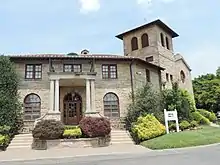| Flushing Cemetery | |
|---|---|
 The 9/11 Memorial at Flushing Cemetery | |
| Details | |
| Established | 1853[1] |
| Location | |
| Country | United States |
| Coordinates | 40°45′6″N 73°47′58″W / 40.75167°N 73.79944°W |
| Find a Grave | Flushing Cemetery |
| The Political Graveyard | Flushing Cemetery |

Flushing Cemetery is a cemetery in Flushing in the borough of Queens in New York City, New York.
History
Flushing Cemetery has several predecessors. In the year 1789 (64 years before the cemetery was founded), George Washington had crossed the East River on a personal mission aboard his barge.[2] Washington, like other noted landowners, journeyed to Flushing: The community was a center of scientific horticulture.[2] The cemetery's floral and arboreal beauty have become a memorial to Flushing's status as a center of horticulture to this day.[2]
During the year of 1853 in which the Flushing Cemetery was founded, the population of Queens County was around 20,000. The land the original site for Flushing Cemetery would rest was the 20-acre John Purchase farm, which was selected by committee. A select number of individuals who attended the founding meeting: Reverend John Gilder, Henry Christie, William Leonard, Caleb Smith, and Robert B. Parsons.[3] Civic-minded citizens like these people had also organized the Flushing Cemetery Association.[4] The day these founders received their charter was May 5, 1853 was the same day in which the World's Fair in New York Crystal Palace was scheduled to open.[4] Civil engineer Horace Daniels was responsible for plotting the grounds. In 1875, the Whitehead Duryea farm, which measured 50 acres and adjoined the cemetery, was purchased and added to the site.[5]
The Bayside Quakers and some of their relatives and neighbors, in about 1860, brought a half-acre within this cemetery in the western half of section I.[6] Section I, which is also referred to as the Quaker Burial Place of Flushing, is where 43 people (the largest in one group) are buried, while 109 were buried in Flushing Cemetery.[6]
The Flushing Cemetery, where 41,000 bodies are buried and thousands more with reservations, has flowers, trees, and greenswards.[7] Roland Schultheis, a scholarly man, became the keeper of the Flushing Cemetery and took great pride in caring for it.[7]
The preservation of the cemetery has also been regarded as a significant task. Individuals with both intelligence and distinguished family backgrounds have preserved its unusual beauty.[8] The cemetery's manager Roland Schultheis was a descendant of the Schultheis Brothers who were internationally famous with their nurseries in Frankfurt, Germany, the largest in Europe: It is possible that Shultheis' ancestors were buried in this cemetery.[8]
Burials
- Louis Armstrong (1901–1971), musician and singer
- Bernard Baruch (1870–1965), financier, after whom Baruch College is named
- Laurie Bird (1952–1979), a film actress and photographer
- Eugene Bullard (1895–1961), the first African-American military pilot
- Ellis Parker Butler (1869–1937), author of Pigs is Pigs
- Adam Clayton Powell, Sr. (1865–1953), cleric
- Charles S. Colden (1885–1960), lawyer, Queens County District Attorney, and New York Supreme Court Justice
- Albert Fish (1870-1936), serial killer
- Joseph Fitch (1857–1917), lawyer, assemblyman, and city magistrate
- Dizzy Gillespie (1917–1993), jazz trumpet player[9]
- Hermann Grab, writer
- Johnny Hodges, long-time Ellington band sideman and soloist
- Thomas Birdsall Jackson, United States Congressman
- Jan Matulka, Modern artist
- Lemuel E. Quigg, United States Representative from New York
- May Robson (1858–1942), actress
- Aris San, Greek singer who spent most of his life in Israel and United States.
- Vincent Sardi Sr., founder of Sardi's restaurant.
- Hazel Scott (1920–1981), musician and singer
- Charlie Shavers, jazz trumpet player
- Battling Siki (1897–1925), boxer, remains repatriated to Senegal
- Frederic Storm (1844–1935), US Representative for New York (1901–03)
References
- ↑ erpietri. "Flushing Cemetery". Forgotten NY. Retrieved 2008-05-28.
- 1 2 3 Stuart, Schuyler Brandon. "The Story of Flushing Cemetery ". Published for the Tri-Centennial of Flushing 1645–1945. p. 3
- ↑ Anonymous. "Flushing Cemetery: 100th Anniversary". Flushing, New York, 1853–1953. p. 10
- 1 2 Stuart, Schuyler Brandon. "The Story of Flushing Cemetery". Published for the Tri-Centennial of Flushing 1645–1945. p. 7
- ↑ Anonymous. "Flushing Cemetery: 100th Anniversary". Flushing, New York, 1853–1953. p. 11
- 1 2 Brierly, J. Ernest. "Long Ago On Long Island". Long Island Daily Press. 20 Aug. 1967.
- 1 2 Welsh, Frederick J. "He Has Made Flushing Cemetery A Place of Botanical Beauty". 5 Aug. 1951.
- 1 2 Brierly, J. Ernest. "Long Ago On Long Island". Long Island Daily Press. 10 Apr. 1966.
- ↑ https://www.grade-a-fancy-magazine.com/2015/05/six-feet-under-borough-of-jazz.html